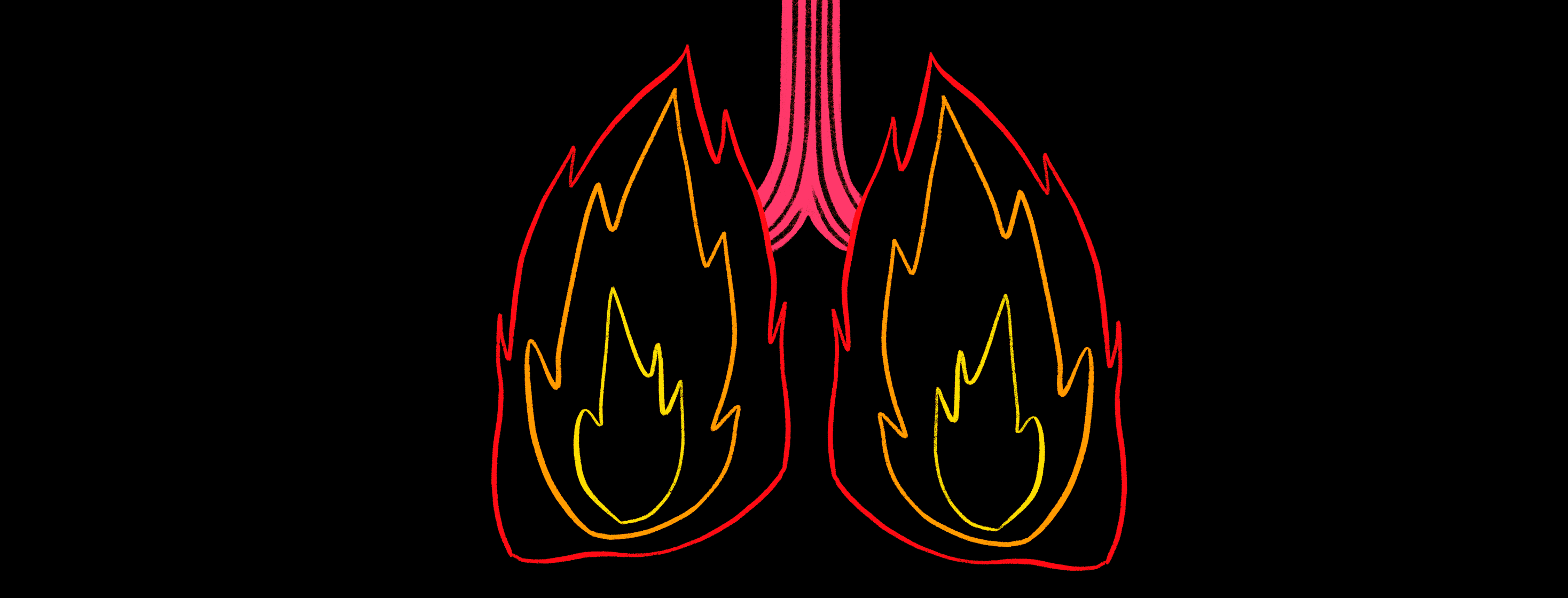Pleurisy
Cystic fibrosis (CF) is a chronic disease that primarily impacts the lungs. Lung infections are more severe with lung disease. They cause symptoms to worsen. The risk of hospitalization for lung infections increases with CF.
Being aware of different infections helps you catch and treat them early. One infection that impacts CF is pleurisy.
What (and where) are the pleural layers and pleural space?
To understand pleurisy, first we need to consider anatomy. The body has 2 pleural layers. The parietal or outer pleura attaches to the chest wall. The visceral or inner pleura covers the lungs. The outer pleura has pain receptors, and the inner does not.1-3
The pleural layers are thin membranes, often described as like tissue paper. There is a small amount of space between the 2 pleural layers. This is the pleural space. This space has a small amount of pleural fluid. When healthy, the pleural layers float past each other as you breathe.1-3
What is pleurisy?
Sometimes the lungs become infected. Pneumonia is the most common infection to cause pleurisy. An infection causes the pleural layers to become inflamed.1-3
When inflamed, instead of floating past each other, the pleural layers rub against each other. The tissue paper suddenly feels more like sandpaper each time you breathe. Infected pleural layers may cause fluid to build up in the pleural space. Both the infected layers and the fluid buildup make it painful to breathe.1-3
Symptoms of pleurisy
The 2 most common symptoms of pleurisy are chest pain and shortness of breath. The chest pain feels better when you are holding your breath and worse when you:1-3
- Breathe
- Sneeze
- Cough
You take frequent, shallow breaths when it hurts to breathe in and out. This leads to feeling short of breath. You might also experience:1-3
- Fever and chills
- Cough
- Weight loss
Diagnosing pleurisy
Any new chest pain is a good reason to go to a doctor for a diagnosis. Chest pain has many causes, including pleurisy, and should not be ignored. Your doctor will begin with an exam and medical history to diagnose pleurisy. Possible tests to confirm the diagnosis include:1-3
- Chest x-ray
- Blood work
- Ultrasound
- Arterial blood gas
- MRI (magnetic resonance imaging)
- CT (computed tomography) scan
Treating pleurisy
The level of inflammation and fluid buildup affects treatment. Your doctor may recommend Tylenol® or ibuprofen for pain and inflammation. If you are coughing, your doctor might add a prescription cough syrup.1-3
The doctor may perform a thoracentesis. This procedure uses a needle to draw the excess fluid from the pleural space. Testing the fluid helps the doctor figure out which antibiotic you will need.1-3
Pleurisy complications
Pleurisy can include 3 different complications with fluid buildup:2,3
- Pleural effusion is the significant buildup of fluid in the pleural space. When fluid builds up, the chest pain may lessen. Excess fluid separates the inflamed pleural layers and keeps them from rubbing against each other. The infection is still there, but the fluid hides the symptoms.
- Atelectasis occurs when the fluid buildup causes a complete or partial lung collapse. The fluid increases to a level where it compresses the lung. Coughing is a more common symptom in this case. You will also feel more shortness of breath.
- Empyema (not to be confused with emphysema) is infected pleural fluid. This leads to a buildup of pus in the pleural space. Fever is common with infected pleural fluid.
CF and pleurisy
Pleurisy is a frequent complication for those with CF. As CF progresses, the risk of pleural infections increases.4-6
The most significant risk for CF is when the infection comes from drug-resistant germs. Over time those with CF often develop drug resistance. This means certain germs do not respond to antibiotics. The more drug-resistant the body becomes, the harder it is to treat an infection. When pleurisy germs are drug-resistant, they contribute to disease progression.4-6

Join the conversation